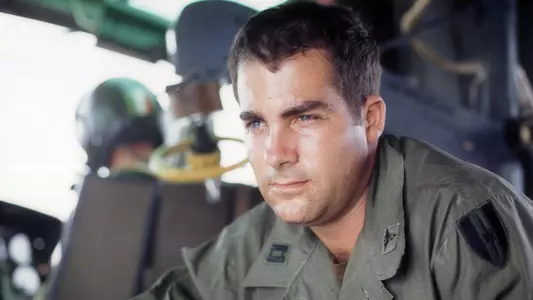The University of Texas at Austin Athletics

Texas Lottery Veteran Recognition: Joseph Beal
11.23.2022 | Longhorn Sports Properties / Learfield
The Vietnam Army Captain will be honored when Texas Football hosts Baylor on Nov. 25.
Joe Beal, inspired by his older brother Dick, translated the ethic of servant leadership –
which shielded and preserved many under his command during Vietnam –
into the expansive field of engineering and environmental consulting, and he continues to shepherd veterans and ensure their voices and combat experiences are valued.
Beal is a sixth-generation Texan. He graduated from Woodrow Wilson High School in Dallas and then attended Texas Tech where he studied to become a civil engineer. In 1967, his second to last year at Texas Tech, Beal joined the ROTC and began his journey of wartime service. He was commissioned into the Army as a Second Lieutenant in the Medical Services Corps.

Dick, older by five years, had already forged the Beal family line into Vietnam. He decided at an early age to devote his life to a military career; Dick graduated from Texas A&M, was commissioned as an officer and served as a general's aide before being among the first units deployed into Vietnam in 1965. From afar, he and Joe corresponded by letters, and Dick, an infantry commander, helped to inform Joe about the realities of war and what Vietnam was going to be like.
From 1966-70, both Beal brothers were deployed into Vietnam. Dick was eventually promoted to the rank of colonel, taught at West Point, was a Brigade Commander and served under Colin Powell when Powell was chairman of the Joint Chiefs of Staff. Dick passed away suddenly in 1989 in the Pentagon at the age of 48 and is buried in a place of honor at Arlington National Cemetery.
"My brother is a hero – a highly decorated major during Vietnam and a real soldier's soldier," Joe said. "I just tried to survive. I am not a hero, although we may have done heroic things. It was just happenstance, answering the moment."
Joe Beal was trained in medical service at Fort Sam Houston in San Antonio and then was sent to the 82nd Airborne Division at Fort Bragg, North Carolina. Beal was assigned to the 44th Medical Brigade in the Republic of Vietnam. He served in the Central Highlands until being promoted to captain and then was assigned as a Detachment Commander. Though his unit's primary focus was preventative medicine, Beal realized there was spare time and other needs; the field suffered a significant lack of medics. He allowed his team to volunteer for combat, treating and removing wounded soldiers from the imminent harm of the battlefield and helping the local Helicopter Medical Evacuation Unit. Beal often led his team out in advance of planned battles and had helicopters in position; he even helped in the operating room when needed.

With only days remaining on his tour of duty, Beal was wounded during a medical civic action assignment; he was evacuated to Japan and eventually San Francisco, where he recovered and received honorable medical discharge. Beal received numerous military awards, including the Bronze Star Medal.
As his Army career was winding down, Beal applied to the master's business program at the University of Texas. Although his application was originally denied, Beal negotiated for acceptance based on his leadership and military combat experience, and the UT registrar relented. He moved to Austin directly from his recovery stint in San Francisco and earned his MBA, with focuses in finance and construction management, in 1979.
"It was the smartest thing I ever did," Beal said.
He soon joined Espey Huston and Associates as one of the first employees and senior vice president. As the company experienced significant growth and expansion, Beal said his master's education prepared him to speak and collaborate with people from any industry, and he enjoyed using his engineer's vision with a financial aptitude to figure out how to fund interesting designs.
Beal retired in 1990 at the age of 50, but soon discovered another line of service with the Lower Colorado River Authority. He joined as head of water and land resources, advanced to general manager and found fulfillment serving the people of Texas. In addition, Beal also discovered meaning in establishing a culture of veteran recognition at LCRA. The organization started to recognize Veterans Day and hosted internal celebrations.
He continues to serve on the Board of Directors for Honor Flight Austin, which recognizes veterans from World War I, Korean War and Vietnam, and flies groups to see their memorials in Washington D.C. Beal's participation with Honor Flight helped him to personally integrate his own experiences with battle and loss.
"In our era, you just did not talk about it. Our nation did not welcome back the returning Vietnam veterans. I didn't tell anyone I served in Vietnam until post-Gulf War," Beal said.
As the pace of life changes, often upon retirement, many veterans –
including Beal – begin to experience the symptoms of post-traumatic stress, and it helps to find community and talk about those memories and experiences.
"It's part of the healing process. You can cope and talk about it – get it into the open," Beal said.
Thanks to the Texas Lottery, great things are happening all across Texas. The Texas Lottery now consistently contributes more than $1.6 billion of lottery revenue each year to good causes like public education and veterans' assistance programs. Beginning with the first veterans' dedicated scratch ticket game in 2009, the Texas Lottery has now contributed over $196 million to the Fund for Veterans' Assistance.
Since 1992, the Texas Lottery has generated more than $35 billion in revenue for the state of Texas. Through strict adherence to their vision, mission and core values, the Texas Lottery is dedicated to ensuring that this support continues.

